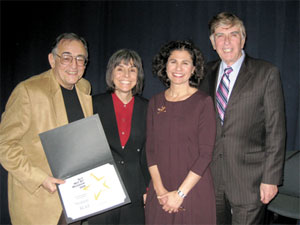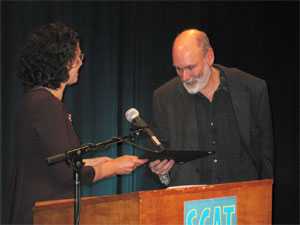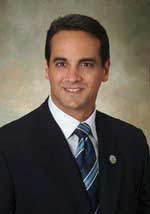| SOMERVILLE – Mayor Joseph A. Curtatone announced today that he has convened a special Financial Advisory Committee (FAC) to provide expert advice on both cost-saving and revenue-producing measures designed to help the City maintain its financial strength in the face of a deepening economic recession and impending mid-year cuts in state aid to Somerville and other cities and towns. The new committee, which will convene later this week, includes Samuel Tyler, President of the Boston Municipal Research Bureau; Jonathan G. Sloane, President and Co-CEO of Century Bancorp; Geoffrey Hargadon, Sr.Vice President for Investments, UBS Financial Services; Ronald Bonney, Jr., President of Bonney Automotive and Executive Committee Member of the Somerville Chamber of Commerce; and Professor Daniel Richards of the Tufts University Economics Department.
"We began preparing an internal review of cost-saving and revenue options back in late October, but the new round of anticipated cuts in local aid means that we have to find a way to close an additional $3 million gap in the current fiscal year," Mayor Curtatone said. "Somerville may be in better fiscal shape than many other cities and towns in Massachusetts, but we're still faced with some painful choices – and we don't expect much if any improvement in 2010. We could complete this process internally, but why shouldn't we draw on the wisdom and expertise that's available all around us? We've never been shy about turning to outside experts for advice about municipal best practices, and I welcome the fresh perspective this distinguished outside group will bring." Curtatone explained that the FAC would have the opportunity to make cost savings, cost recovery and financial management recommendations in all areas of city government, and would address both operating costs and capital spending. "All options are on the table, but my charge to this new committee is to help us avoid service cuts and layoffs if at all possible," Curtatone said. "In the end, this new advisory group can't make the tough decisions for us, but they can offer helpful guidance, and I am pleased that the Mayor is establishing this special committee," said Ward 2 Alderman Maryann Heuston, who chairs the Board's Finance Committee. "I also think that having an outside group involved adds an extra measure of transparency to what is going to be a challenging process – and that's important if the public is going to have confidence in the final plan that the Mayor and the Aldermen develop." "Even as he proposes cuts in local aid, Governor Patrick has been careful to argue that cities and towns should be given more management tools to control costs and develop a more balanced revenue base," said Curtatone. "But even if we gain the option of a modest increase in meals or hotel taxes, and even if the legislature is finally able to close the obsolete and pointless Telecommunications Tax loophole, we won't see any new revenue from these changes until next year. We need to act now to make up for these cuts – and we will." "Somerville is a regional leader in adopting municipal best practices to improve service efficiency," said Samuel Tyler. "However, the size of the state aid cuts this year and next will require creative but hard choices and I am happy to join the Advisory Committee members in bringing outside thinking to address this challenge." Curtatone said the group would be convened as quickly as possibly and would report back with recommendations by mid-March at the latest. "We'd be happy to act even faster on interim recommendations that the committee may choose to make before their final report," said Curtatone. "I'm sorry to impose such a tight timetable, but we really don't have a choice. We have to begin closing the local aid gap well before the end of the current fiscal year on June 30th. "In the meantime, I will also begin talking directly to our union leaders across city government," said Curtatone. "We want to partner with organized labor on developing realistic approaches to keeping cost under control while maintaining core services. I anticipate their willing cooperation." |
|
By Doug Holder Bill Galatis is a native Somervillian who doesn't have any half-baked ideas. Several years ago, he bought Somerville's iconic bakery Lyndell's in the Ball Square section of our city. Galatis is also the co-owner of 35 Dunkin' Donuts stores in the greater Somerville area. Galatis, a man in his mid-fifties, lived in Somerville until he was 13 years old and has never lost touch with the 'ville. Besides owning Lyndell's and the Dunkin' Donuts stores, he is also a member of a prominent Greek Orthodox Church in our city. In spite of the economy, Dunkin' Donuts remains a steady business because of its low prices and quality products. Galatis admits that Dunkin' Donuts occupies a different niche than the stylish Starbucks, and he has no problem with that. Although Galatis was a corporate accountant for many years, the food service industry was in his blood. As a young man, he worked in his father's diner and liked the idea of being an entrepreneur. So, in 1990 he and some partners bought a franchise of Dunkin' Donuts, and that has expanded into a fleet of stores. Galatis told The Somerville News, at their Friday editorial meeting, that his grandfather, an immigrant from Greece, settled in the Brickbottom section of the city, now home to the famed Brickbottom artists' residence. The Lyndell's bakery acquisition was an emotional one for Galatis. He is well aware of its history, dating back to its inception in 1887. His sister Karen runs the store and he leaves the baking to the long employed bakers who know the biz like the back of their powdered hands. Lyndell's has many bakery favorites like Ricotta Pie, Cannolis, Fruit Tarts, Lobster Tails and many others, as well as the much-in-demand Honeycomb Bran Bread (get in line folks!) Galatis has long-range plans to remodel Lyndell's. He has the idea to restore it to its original 1800's grandeur. He has already consulted with an architect and seems committed to the idea. Galatis is much more than a savvy businessman. He is a well-known philanthropist, on the board of trustees at Anatolia College in Greece, and involved n public service initiatives in the area. Galatis is optimistic about his business and other interests and remains strongly committed to Somerville, the city of his birth. As he told the News: "Somerville will always have a special place in my heart." |
|||||||
By Vladimir Lewis A celebration of a successful year and concerns over pending legislation were the highlights of SCAT's Annual Meeting and Awards Night, Thursday, Jan.22. Mayor Curtatone, the SCAT Board of Directors, and many contributors met to honor achievements in the past year and to report on the organization's well-being at Somerville Community Access Television's Union Square headquarters. A catered buffet dinner was served and then the televised awards ceremony began. Candace Dostert, outgoing president of the board, spoke first. "This is a good time to come together to celebrate our accomplishments over the last year," she said. Dostert praised her talented staff and also plugged for new members. "If you're watching at home and are thinking about this, please do come down and check us out. We're always looking to grow our membership." Mayor Curtatone praised the community television station. "For more than a quarter of a century SCAT has played an important role right here in Union Square." The night was mainly a light-hearted event, but there was a serious tone when the mayor continued. "We're working hard with RCN to renegotiate a franchise (contract). But, Verizon is, as we speak, organizing legislation to get rid of local franchising and to go to the statewide system…we need to be tenacious about this. Stations like SCAT will be silenced if we allow this to happen. We will get the deal done and it will be fair and equitable, but we need (all of) you to step up and support us all,." he said. Curtatone said, "If anyone from Verizon is listening (currently) we invite you to come to Somerville and meet us." Richard Scheiferdecker, the new board president, gave a huge bouquet of flowers to Mrs. Dostert and said,"Candace will be a tough act to follow." Dostert praised her colleagues. "After 7 years on the board, I'm sad to be leaving, but I want to thank everyone from the very talented and dedicated staff as well as the endless stream of volunteers and interns…SCAT will be in good hands." Scheiferdecker also said," I look forward to keeping SCAT as a really vibrant human resource." Current board members were acknowledged. New and leaving members were mentioned. John Carreiro, member representative, was leaving the board. "John will be missed. He always had great ideas and served as a liaison for us with the Portuguese community," said Wendy Blom, SCAT Executive Director. Eta Shrestha was announced as a new board member. Blom presented a status and treasury report for absent treasurer Mimi Graney "I thought you'd appreciate some good news and that's what you're going to hear. We are financially sound and conservatively sound. There were just over 450 thousand dollars in expenses for the year with a modest surplus. 62 thousand was spent on new equipment. Our investments are diversified and in low-risk funds, so our organizational savings are still secure. Our bread and butter remains the franchise fees that Somerville collects yearly from RCN and Comcast." Blom said, "It's wonderful to have such talented people in our studio and |
|||||||
By Keith Cheveralls A Entitled "Anybody who has a 7 or 8 percent mortgage now could refinance and get Many existing homeowners cannot Typical "I've been doing this for 30 years, and The bill comes "I think it's a great bill; its part of Somerville's "There are a number of proposals designed to help The "This kind of a bill is good, because it's not giving The |
||||
By Joseph A. Curtatone I Still, now that Governor Patrick My answer is that, as a I I am also grateful to the Governor for once So how, between now and the Another part of the answer is that we But because the changes we have already made I've That commitment is Here in Somerville, we will make whatever hard I still believe that we |
|||
By Cathleen Twardzik After The new fire doors are working well, according to "Right now, we Allegedly, after having Each year, the total enrollment of the after school Following the incident, Currently, additional preventative measures, aside How will the school attempt to "After this In addition, student's files were Before The school installed the doors "because we're required |
||||
How So when you Let me tell you, if I ever fell in front of your apartment Hey Mr. Landlord, here is an idea for you – pick If they were my aunts or uncles or I pay decent money for my gym membership because Onward He was looking right at me and getting closer and And all this is going on over a By Saturday By the
|
|||
By Ben Johnson Arts Many local artists and According to their website, the Arts The The Built in 1903 by George A. Moore, the Armory's In 2004 Joseph and Nabil Sater, owners of Over Not everybody in the community is happy about the Most of the McLaughlin and other supporters were In "We want to be a good neighbor." Said McLaughlin. At the end of the meeting, one |
||||

























Reader Comments